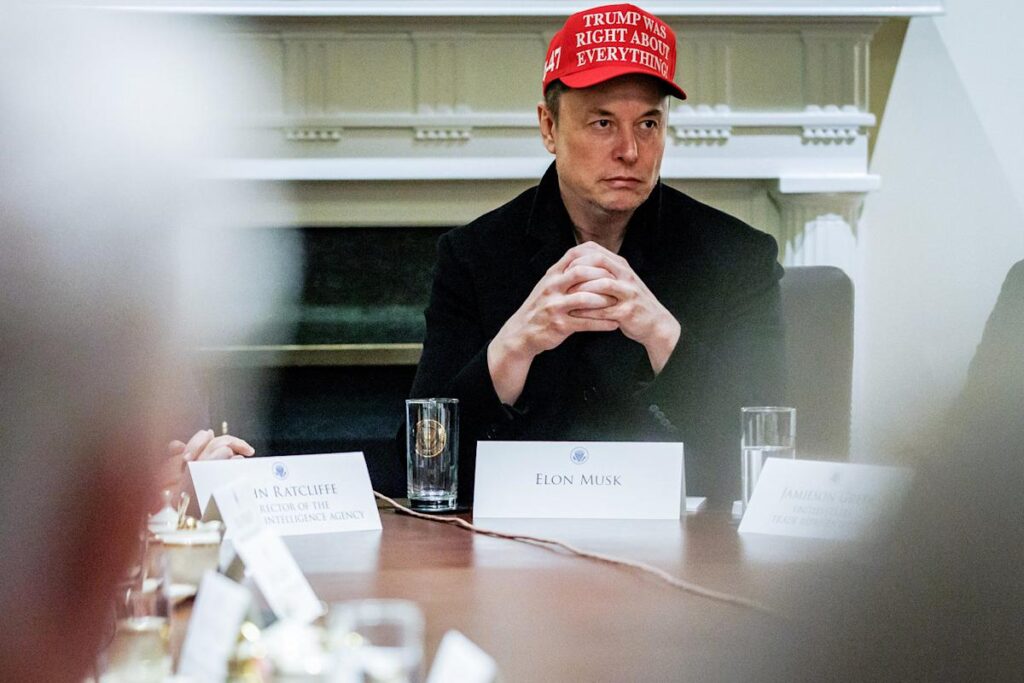As Democrats celebrate a battleground-state win in the most expensive judicial campaign in U.S. history, President Donald Trump and the GOP are confronting a worrying early sign about what the intense spotlight on Elon Musk’s influence means for the party.
Musk, the billionaire White House adviser, played a starring role in the race, using personal funds and allied outside groups to put more than $15 million behind former Wisconsin Attorney General Brad Schimel, the Trump-endorsed candidate who ran against Madison County Circuit Judge Susan Crawford. Crawford and her allies responded in kind, using Musk as a foil and scoring a decisive win.
Though the race was technically nonpartisan, there were intense partisan overtones — and it functionally transformed into a proxy vote on Trump’s first two months in office and especially on Musk, who has become one of the most powerful people in Republican politics since Trump won last year.
Yet while the results were not promising in Republicans’ first statewide test of the second Trump administration, Trump advisers are — at least for now — brushing off the loss, noting it was an off-year election with lower turnout than the recent presidential race.
“The results are what they are. It’s an off-year race and predictive of nothing,” a Trump adviser said. “I don’t think you can read too much into it, including Elon’s role.”
A source familiar with Musk’s thinking was on the same page, brushing off the loss as the result of an “uphill battle.”
“Elon was a happy warrior this entire race, knowing full well it was an uphill battle. The only reason Schimel was able to make this a race was because Elon got involved,” said the source familiar with Musk’s thinking. “He put the Democrats on defense and made them empty their coffers in a race that should’ve never been competitive.”
The person added that Musk’s effort to help Republican campaigns will continue.
“He’s going to continue to be active and isn’t ceding anything to Democrats,” the person said.
Elon Musk at the White House on March 24.
Even so, on the heels of Schimel’s loss, Republicans are assessing how Musk’s spotlight-stealing influence will shape key political races headed into the midterms in 2026, when Republicans will defend a narrow House majority. While turnout in Wisconsin did not hit presidential levels, it did come close to the number of people who voted in the 2022 midterms in the state — closer to a regular election than a low-turnout blip.
“Elon is great for Trump because he’s a shield,” said a Republican operative who advised Musk on the Wisconsin race. But, the person added, the ability to attract so much heat is “bad for elections, because he energizes the Democrats.”
The recent NBC News poll found a majority of voters nationwide (51%) holding negative views of Musk, while 39% viewed him positively. Neither Musk nor Trump had spoken publicly about the Wisconsin result as of 11 p.m. Tuesday.
The White House’s political arm, including Musk, played an “unprecedented” role in the contest, highlighting the importance of the race to Trump — and the stinging nature of the loss. Trump endorsed Schimel and publicly hyped the importance of the race, but much of the attention in the weeks leading up to Election Day were squarely focused on Musk, who was Trump’s biggest donor last year and has signaled ambitions to use his massive wealth to influence races in the future.
Beyond giving huge sums of political cash to Schimel, Musk set up a petition contest that made those who signed up to fight “activist” judges eligible for a $1 million prize, and he also held a rally for Schimel on Sunday. At the rally, Musk said the race could “affect the entire destiny of humanity.”
“I would call it unprecedented,” former Wisconsin GOP chair Andrew Hitt said of the White House’s role in the state race. “Never been done before in terms of their involvement.”
He said that the race was without question viewed through a Trump-Musk lens as it started to gain more national attention but that it was not always just Democrats trying to make that brand stick.
“I think as the race nationalized, I would say in some ways the right defined ourselves as having the Trump-Musk candidate,” Hitt said. “The left really did not have to do that; it was conservatives who did that.”
Hitt was surprised at how much Crawford was winning by late Tuesday, but he said he did think Musk helped energize grassroots Republicans in the state after he got fully involved.
“He helped close the gap, I believe,” he said. “We will see where the margin ultimately lands, but it felt like Elon was energizing people. Maybe not? We will see where the final numbers land.”
Trump beat Vice President Kamala Harris in the state by less than 1 percentage point last year — the third straight time the presidential race has come down to decimal points in Wisconsin.
“Wisconsin is a big state politically, and the Supreme Court has a lot to do with elections in Wisconsin,” Trump said last week. “Winning Wisconsin is a big deal, so therefore the Supreme Court choice … it’s a big race.”
But Trump supporters focused Tuesday on wins they notched in two Florida congressional seats, which will help ensure Republicans maintain their slim House majority. Democrats made some gains amid low turnout in the deep-red seats, but both GOP candidates still won comfortably.
“Democrats held Wisconsin’s Supreme Court seat while Republicans won both congressional races in Florida,” a former Trump adviser said. “Republicans have maintained our majority in the House, and, most importantly, Democrats will not be able to impede on President Donald J. Trump’s America First agenda.”
This article was originally published on NBCNews.com
Read the full article here
